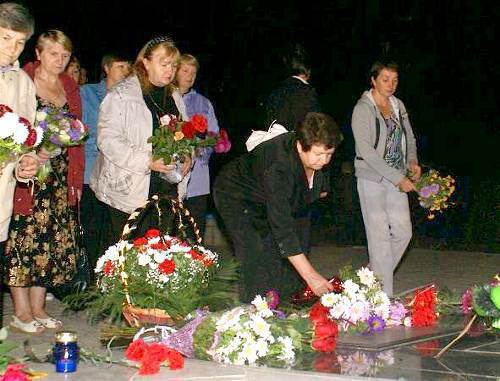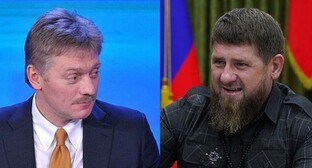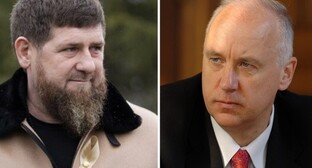
16 September 2011, 23:00
Volgodonsk residents commemorate victims of 1999 terror act
Today, residents of the city of Volgodonsk, Rostov Region, have paid tribute to the victims of the terror act committed in this city on September 16, 1999. That crime killed 19 persons; 73 citizens became invalids; and in total over 16,000 people, including more than 1000 children, were officially recognized to be victims.
In Volgodonsk, mourning ceremonies began from early morning
The memorial was visited by relatives and friends of the casualties, the rescuers and fire fighters, who had arrived to the place of the tragedy in a couple of minutes after the explosion, and representatives of the public and local authorities, who came to lay flowers.
The "Caucasian Knot" has reported that actions within the Memorial Day of the Volgodonsk residents, who perished in the terror act, began in the early morning. The terror act was committed at six in the morning, when most residents of Volgodonsk were still asleep.
Dmitry Nikolenko, one of the participants of today's ceremonies and a witness of the tragedy, also came today to commemorate the casualties.
"On that day at six in the morning I was awakened by the explosion and heard screams. My mother started crying that we should leave the house immediately, as it would soon collapse. I couldn't understand what was happening. When I left the room, I saw that the blast had knocked out windows and doors. Our front door was moved by about five feet down the corridor," said Dmitry Nikolenko.
When he came out of his apartment, he understood that not his house was blown up.
He says that most of the families of the exploded house were moved to other flats. "Although a lot more houses were damaged, including our one. All residents received compensations, but small ones. Windows and doors of our flat were broken; our furniture was severely damaged. I remember that after the explosion we had to renovate the whole flat. The appraisal commission came to us for a few times. Initially, they promised to pay for all the destructions; but then they began saying that we could plaster and paint many points by ourselves. As a result, the compensation money was only enough for the front door," said Dmitry Nikolenko.
Yegor Kulinev, Head of the Search and Rescue Service of the Department of Civil Defence and Emergencies of Volgodonsk, who was among the first to arrive 12 years ago at the place of the explosion, could not attend the ceremonies today; however, he recollects the tragic events in detail.
"When we arrived at the place of the tragedy, we saw a piece of war. It was a terrible picture that our entire city will never forget. There was a great mess, because the city could not expect that scale of tragedy, although we worked expeditiously. Rescuers from other cities came to help us. We quickly organized hot meals. There was a lot of work. I remember how we rescued an elderly woman from under a heavy slab, which was thrown over her by the blast," said Yegor Kulinev.
Public is still looking for answer: who is guilty?
The members of the public commission for investigating the explosions of apartment blocks committed in 1999 in Moscow and Volgodonsk believe that real customers of the terror act have not been named yet.
"In Moscow, the trial was behind closed doors, with no transparency. What was that secrecy for? It looks like the state was interested to hamper the inquiry. The public commission set up to investigate the explosions also failed to reach results. Its work was stopped after the death of its member Sergey Yushenkov and Yuri Schekochikhin, while the lawyer Mikhail Trepashkin, who defended the victims' interests, was accused of keeping a pistol that had been planted on him and put away behind bars for several years," Lev Ponomaryov, the leader of the movement "For Human Rights", asserts.
According to his story, friends and close relatives of casualties and victims failed to exhibit persistence in seeking answers to all difficult questions.
The human rights activist Elena Ryabinina believes that there is nothing surprising in such behaviour of Muscovites. "It's not apathy and cynicism - it's fear," she said.
In his turn, Mikhail Trepashkin, the advocate for the victims of the explosion of the house in Guryanova Street, told the "Caucasian Knot" correspondent that he faced obstacles in carrying out his professional activities.
"I was defending the interests of Alyona and Tatiana Morozova, who suffered at that explosion, in 2001, that is, two years after the tragedy. I had thought that by that time, security services should have answered all questions; but it turned out that the investigation was even not over; questions remained unanswered; and the inspector running the case was hampered. The investigator Alexander Chaika told me that as soon as he appointed some important examination or action, he was sent on a business trip: to Mozdok, for example, or somewhere else. They didn't allow me to confront witnesses; several times suspects' identikits were replaced," said the lawyer Mikhail Trepashkin.
Lawyers: compensations are miserable, lawsuits are senseless
According to Mikhail Trepashkin, in most cases, victims and casualties' relatives were not recognized as affected persons and received no compensations.
The lawyer Igor Trunov, who also defended the rights of the victims, supports this opinion.
"Within the criminal case, about three thousand people were recognized as affected persons from the apartment bombings in Moscow and Volgodonsk. However, only dozens of them received compensations. The amount was very small - 7000 roubles, which is incomparable with the million-worth compensations paid out to victims of the explosion in Domodedovo. Besides, in 1999 people lost their housing and property. Of course, many people regarded these 7000 roubles as a mockery of the authorities and didn't seek help, since the compensation failed even to cover their travel expenses, not to mention the loss of their beloved ones, and lost health, housing and property. They had collected huge amounts from Dekkushev and Krymshamkhalov (those convicted for exploding residential buildings in Moscow, - note of the "Caucasian Knot"), but nobody received anything," said the lawyer.
According to Igor Trunov, in the near future, the European Court of Human Rights (ECtHR) should consider the claim of his five clients against Russia's refusal to pay compensations.
However, he has noted that the situation with consideration of the claim of nearly 3000 victims by the ECtHR is treated by him as "very sad": now, 12 years after the tragedy, its consideration has not even begun.
"Once we even wrote a letter there requesting to expedite the proceedings. They answered that when Russia ratified the 14th Protocol to the European Convention on Human Rights (ECHR), the case progress would fasten. However, the Protocol was ratified, but the deadlock is still there," he said.
According to Mr Trunov, the reason is in the fact that the European community is afraid to study cases related to terrorism.
The situation with compensations is further aggravated by the fact that many victims find it senseless to file claims for compensation twelve years after the terror acts.
"Unfortunately, the situation is such that consideration of many important aspects has been ruined; the time for filing claims was lost. In particular, the point should have been not only about compensations, but also about the violation of the right to life. Soon, Paris will host a conference with participation of victims of terror acts committed in Russia, where many issues will be raised, to which Russia and its judiciary have no answers," Karina Moskalenko, an advocate for the victims in the case of apartment bombings in Moscow and Volgodonsk, told the "Caucasian Knot" correspondent.
Kovalyov: society has the right to demand answers on terror acts
Meanwhile, Sergey Kovalyov, a well-known Russian rights defender and former State Duma Deputy, believes that the society has the right to ask the authorities, any, even the most awkward questions. And should they avoid answering - to suspect them of committing the crimes themselves.
Let us remind you that the former FSB Lieutenant-Ccolonel Alexander Litvinenko had stated that the bombings of apartment buildings in Moscow and Volgodonsk, and preparation of similar explosions in Ryazan explosions in Ryazan in 1999, was the guilt of Russian special agencies.
After appearance of his book "The FSB Blows Up Russia", certain experts, in particular, Professor Matthew Evangelista, Cornell University, began viewing these bombings and involvement of the FSB in them as one of the triggers of the second Chechen war.
"It's a terrible assumption that some state agencies could commit such bombings; however, the authorities have every opportunity to refute such speculation and suspicions by investigating into all the versions of these crimes, including the ones that assume involvement of state structures in such tragic events. Only in this way they can refute the suspicions," said Sergey Kovalyov.
According to his story, the Russian State Duma Deputies had no chance to get answers from officials on the progress of investigations into the apartment bombings in Moscow, Volgodonsk and Buinaksk.
"Of course, I don't support the idea that the society was not interested in and didn't ask about the true state of affairs. However, if we compare the interest of the society in those who was behind the bombings in Russia in September 1999, and in the USA on September 11, 2001, the comparison is not in favour of the Russian society. In America, too there are people who suspect their state and security agencies of terror acts. Does anyone stop them from doing so? No, these versions are not suppressed there by the authorities," said Sergey Kovalyov.
For several years, a specially set up public commission, which included rights defenders and activists of the Society "Memorial", was running an independent investigation into the Moscow and Volgodonsk bombings.
In summer 2007, the commission announced that it lacked sufficient evidence in order to clearly name the organizers of the bombings - for deficiency of facts they managed to gather outside the official inquiry. Under one version of human rights defenders, the bombings in 1999 were organized by Russian security agencies.
After the undermining of the apartment house in Volgodonsk, Russia's leaders made a decision, arguing that the attacks were organized by Chechen militants, to send troops to Chechnya and launch a broad-scale counterterrorist operation (CTO), also known as the second Chechen war. The CTO regime was cancelled only 10 years later, on April 16, 2009.
According to official data, eight persons were involved in organizing the terror acts in Volgodonsk, and in explosions of apartment blocks in Moscow on September 6 and 13. The organizers of these crimes were foreign nationals Amir al-Khattab and Abu Umar, who were killed by Russian power agents also during a special operation in Chechnya.
Author: Olesya Dianova; Temur Varki; Semen Charnyj Source: CK correspondents




